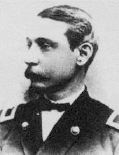Antietam Ranger up for national award
4 March 2007
Thomas J. Jones of the Antietam National Battlefield is among 7 candidates for the servicewide Harry Yount Award for 2007. Ranger Jones has already won for the National Capital Region.
The previous recipients of the award have embodied its intent, which is to honor rangers who, as their career has advanced, have continued to consistently and conscientiously go out every day and do the traditional, generalist ranger duties of protecting the resources and serving the visitor and who have done it well in the eyes of their peers.
Congratulations and thanks for your fine service to Ranger Jones, and best wishes in the “nationals”.
More from the US Park Service press release.
Out of the library, into the streets
3 March 2007
Talking about creating useful digital collections at WebWise 2007 yesterday, Dr. Deanna Marcum of the Library of Congress opined:
… it is not enough for us to create the perfect finding system, we know from all the user studies that individuals who are looking for information go directly to the open web, and our marvelous catalogues are not getting used. We have to find ways to take our content and the metadata and move that content to the open web. And until we do that, I believe we face a high probability of spending much, much, much money on developing bibliographic structures that are only used by a limited number of people. I know that in any organization when people are really good at what they do, it is very hard to abandon those systems. It is not enough to say ≈ìwell, users should use our catalogue.¬ù
Well let's think about how users are finding what they need and go where the users are. What we've always wanted to do. We have talked as librarians about how we want to get information into the hands of the people who need it. We now have the mechanism.
WHY ARE WE MAKING THAT HARD?
We have the opportunity to do what we've always said we want to do. Why aren't we doing it?
This is critical insight. I hope other library and museum people are listening …
Thanks to Holly Witchey, blogging at Musematic, who transcribed the Q&A (and covered most of the Conference). The original question to Dr Marcum that began the conversation apparently came from Murtha Baca of the Getty Research Institute:
What are some of the ways we can combat the idiotic idea that if you scan everything you get good access to it?
Talk about your strawman sans antecedent. I don’t think many people are seriously suggesting any such thing, but it gets the conversation started, right?
Oliver D Greene and the poison pen
1 March 2007
I had a kind email from the g-g-granddaughter of Oliver D. Green, medal of honor recipient and staff officer at Antietam. She corrected my error on AotW in his middle name (it’s Davis). I’m very glad she brought him to my attention.

Oliver Davis Greene
A career Regular Army officer from west-central New York State, Oliver Davis Greene graduated from West Point in 1854 and saw duty in the West with the 2nd US Artillery Regiment. At the start of the War in 1861 he was 1st Lieutenant, Battery G, and was in action as the battery’s commander at First Bull Run in July. He was then assigned as Captain and Assistant Adjutant General (AAG) on Major General Don Carlos Buell’s staff.
In that service Captain Greene made a powerful enemy: Andrew Johnson, then military governor of Tennessee. In 1864, of course, Johnson was elected Vice-President of the United States, and became President himself on Lincoln’s assassination in 1865.
It was at Nashville in the summer of 1862 that Greene and Johnson bumped heads …
